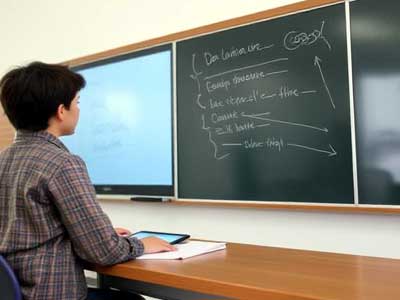From the white dust of chalk to the digital glow of ChatGPT—the journey of education has been nothing short of magical. Once, dreams were painted on blackboards with chalk; today, those very dreams have found new wings in the world of smartboards and AI.
Despite technological challenges, teachers, too, showed courage and innovation. It wasn’t easy at all, but in record time, they became tech-savvy and upgraded themselves to meet new demands. COVID-19 accelerated online teaching, and now AI has emerged as the next challenge.
Read in Hindi: शिक्षा का बदलता सफर, 'गुरुकुल' से 'गूगल' तक...
“Who would have thought that the gurus of the old gurukuls would become tech-savvy so soon?” remarked Anubhav, a senior teacher at St Peter’s College. “Initially, there were obstacles, but with new digital platforms and apps, the system improved. By now, we’ve grown comfortable with everything from Google to ChatGPT.”
Children, too, have adapted quickly. One student taking online tuition joked, “Now the teacher can’t punish us! With parents watching, they hold back their anger and keep their patience.”
But online learning has affected traditional tuition. “After hours of online classes, children are exhausted, and parents hesitate to send them out for extra tuition,” said Mamta, mother of a 12-year-old daughter. “It’s just a temporary arrangement. Kids miss sports, cultural activities, and social interactions with friends—all crucial for their growth.”
In Agra, long before coaching centres took over, some educators are still remembered with affection and respect. Students of St John’s College fondly recall Prof GI David—nicknamed ‘Guddan Pyare’, for his passion for English literature. His former students say he must now be entertaining Shakespeare, Keats, and Shelley with his boundless love in heaven.
Similarly, no one can forget Sister Dorothia’s history classes at St Patrick’s, established in 1842, among the oldest convent schools in Asia. “Her imitation of Hitler was unforgettable,” recalled alumna Mukta. “She taught history with unmatched love and enthusiasm.”
When a retired principal was asked what the biggest change in education he noticed was, he sighed, “Today, teachers can’t cane, can’t make kids kneel, not even scold harshly—parents come running to fight. Indiscipline is at its peak. Without the fear of the teacher, children will go astray. Canning and punishment were essential,” the angry ‘massab’ declared.
Amidst these memories, some scholars also voiced concern over the commercialisation of education. “Now we have teachers, not ‘gurus’. The erosion of moral values is deeply worrying. Children should be trained to resist negative influences,” said a retired headmaster. Senior teacher Meera added, “Education has been reduced to mere skill transfer for the job market. Its true purpose—building character and values—has been lost.”
“Today, there is a lot of money in teaching, but commercialisation has killed its idealism,” Meera said. A retired professor added, “Teachers deserve comfort and facilities, but their responsibility is different—and greater—for society. Mass literacy is important, but we need a balance between quality and quantity. Without dreams, vision, and idealism, education will only produce heartless individuals.”














Related Items
Breaking the ice in Indian Higher Education…
Will TET become guillotine for Indian education system?
Agreement with TTL to enhance technical education in UP